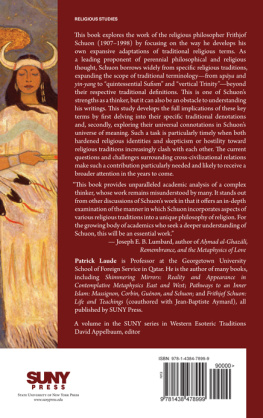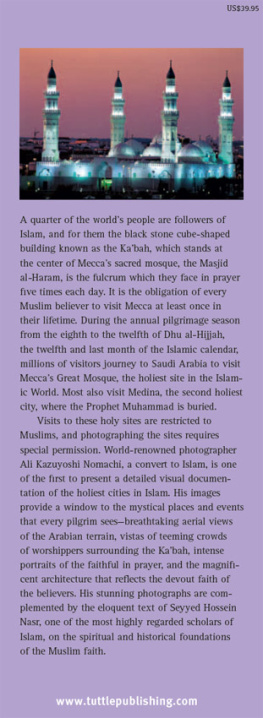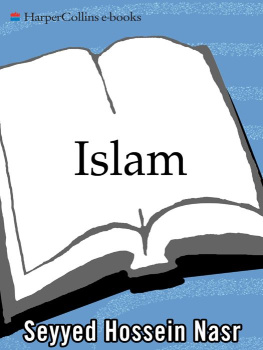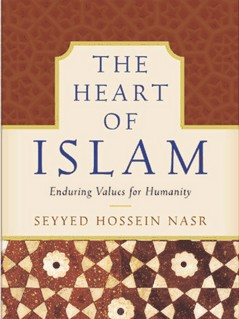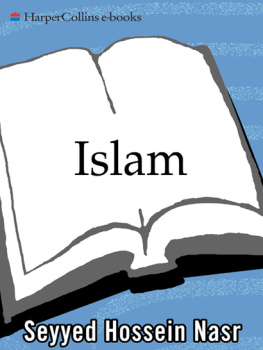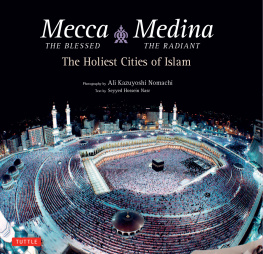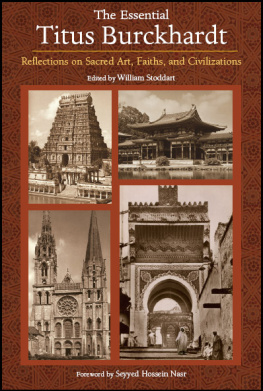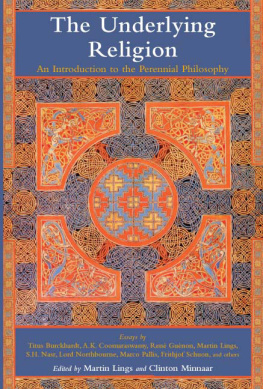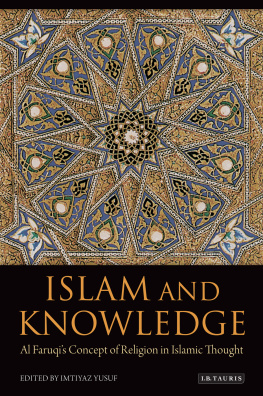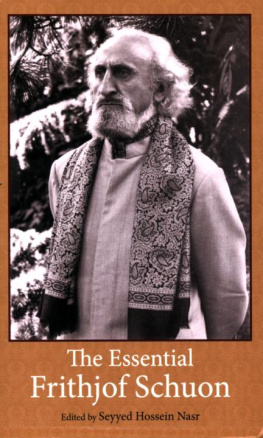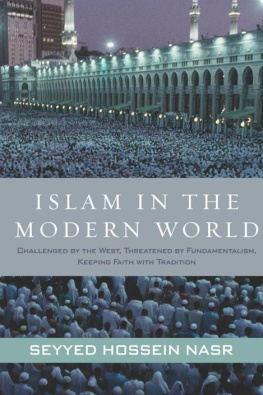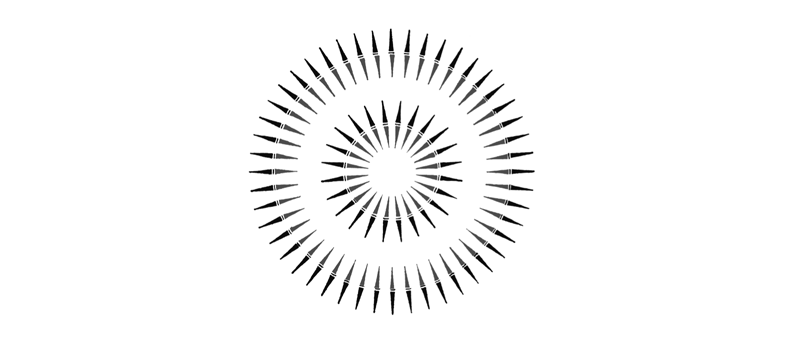Note on the Editor
Patrick Laude teaches theology at the Georgetown University School of Foreign Service in Qatar. His interests lie in contemplative and mystical traditions, particularly in their relationship with poetry, as well as in Western representations and interpretations of Islam and Asian religions. He is the author of ten books, including Pray without Ceasing: The Way of the Invocation in World Religion, Divine Play, Sacred Laughter, and Spiritual Understanding, Singing the Way: Insights in Poetry and Spiritual Transformation, and Frithjof Schuon: Life and Teachings. His latest book is Pathways to an Inner Islam: Massignon, Corbin, Gunon, and Schuon.
METAPHYSICS . COSMOLOGY . TRADITION . SYMBOLISM
STUDIES IN COMPARATIVE RELIGION
The First English Journal on Traditional Studies established 1963
Studies in Comparative Religion is devoted to the exposition of the teachings, spiritual methods, symbolism, and other facets of the religious traditions of the world, together with the traditional arts and sciences which have sprung from those religions. It is not sectarian and, inasmuch as it is not tied to the interests of any particular religion, it is free to lay stress on the common spirit underlying the various religious forms.
One of our primary aims is to meet the need for accurate information created by the now world-wide interest in the question of ecumenical relations between the great religions, by providing a forum where writers of proven authority can exchange views on various aspects of religious life, doctrinal, historical, artistic and mystical, not forgetting the element of personal experience and reminiscence.
By collecting accurate information about the great religions under their many aspects and rendering them available to interested readers we feel we are fulfilling a very pressing need of our time and also contributing in a practical manner to the cause of inter-religious understanding. If there is to be an effective measure of this understanding at any level this can only be on the basis of accurate presentation both of teachings and facts. An ill-informed benevolence is no substitute for genuine insight, based on information that is neither willfully distorted nor confined to the surface of things.
In this manner we think that we are best serving the interest of our readers in their search for truth.
(Excerpt from the Introduction to our first publication, almost fifty years ago)
Universal Dimensions of Islam:
Studies in Comparative Religion
2011 World Wisdom, Inc.
All rights reserved.
No part of this book may be used or reproduced
in any manner without written permission,
except in critical articles and reviews.
Publishers Note:
Studies in Comparative Religion has published articles from over 400 different authors. The original editors of Studies did not insist upon a common convention for the transliteration of foreign terms; consequently a variety of different systems of diacritical mark usage can be found in any given issue of Studies. The current publisher has chosen to continue this policy and will thus remain faithful to the original transliteration convention used by each of its contributors.
Library of Congress Cataloging-in-Publication Data
Universal dimensions of Islam : studies in comparative religion / edited
by Patrick Laude.
p. cm. --(Studies in comparative religion)
Includes bibliographical references.
ISBN 978-1-935493-57-0 (pbk. : alk. paper)
1. Islam--Universality. 2. Islam--Relations. 3. God (Islam)--Attributes. I. Laude, Patrick,
1958
BP170.8.U545 2011
297.28--dc22
2010039310
Printed on acid-free paper in USA.
For information address World Wisdom, Inc.
P.O. Box 2682, Bloomington, Indiana 47402-2682
www.worldwisdom.com
Universal Dimensions of Islam
Editorial
One of the fundamental problems of our contemporary world has been judiciously referred to as a clash of the uncivilized. This conflict has been particularly acute in the encounter between certain mainstream elements of the secular Westwith which one must aggregate, at least outwardly, a few zones of resilient Christian identity and emerging neo-Christian culturesand some of the most visible contemporary expressions of people and societies for whom Islam is the predominant principle of collective identity. In the West, one of the praiseworthy responses to such tensions and oppositions has come from those who have called for a better understanding of Islam. Here, understanding is not meant to refer to a full acceptance, but to a sufficient grasp of the inner and outer logic of Islam, as well as to a degree of recognition of its spiritual and moral values. Perhaps paradoxically to some, such a capacity to understand others presupposes an inner attitude which has everything to do with the degree to which one has assimilated the core principles of ones own civilization. This holds true, needless to say, on any side of the civilizational divide. There is no civilization formed by the sacred that does not ultimately lead its most discerning representatives to perceive in some measure the relativity of its own exclusiveness, at least in petto. To this extent, to be civilized amounts almost as much to recognizing the intelligence and beauty of other civilizations as it is to fathom the foundations of ones own; the latter being, in fact, the precondition, if not the guarantee, for the former.
The writings collected in this volume make the case for a vision of Islam as a religion and civilization intrinsically equipped to address universal human predicaments, and converging thereby with the highest spiritual expressions of all authentic religious heritages. They point to fundamental universals of Islam, such as the doctrine of Unity and unification (tawhd), the essentialness of Divine Mercy, the inclusive and integrative nature of the Muslim concept of prophecy, the Islamic ability to assimilate various cultural and ethnic languages, and the capacity of Islamic mysticism to serve as a spiritual bridge between diverse religions. They include now classic essays by founding fathers of the Perennial Philosophy, testimonies from spiritual figures of Sufism, and contemporary studies of Islam and Sufism by experts and younger scholars of religion. Finally, as the universal language par excellence, poetry could not but be included in this volume.
* * *
The universal dimensions of Islam refer to the dimension of breadth as well as depth. They pertain to both form and essence.
On the level of form, there is to our mind no better way of pointing out this universality than by quoting Schuons assertions that Islam... has given a religious form to that which constitutes the essence [substance in the original French] of all religion The simplicity of the form renders it accessible to any man or woman, and therefore potentially to all of mankind. It speaks to all capacities and levels of understanding. It also allows for its manifestation through diverse cultural contexts, from Sub-Saharan Africa and the Balkans to India and China.
From another point of viewnotwithstanding the expansive potentiality of Islams schema-like formother aspects of its form have placed limits on Islamic expansion. This is particularly true when referring to the Bedouin and Arab cladding, as it were, of the message. Such a cladding is not the best means of exporting Islam, as it enters into conflict with psychological and cultural traits predetermined by other civilizational logics. Be that as it may, this twofold aspect of the Islamic form may correspond to the distinction, on the one hand, between form as an expression of divine essence, or archetypal form, and, on the other hand, form as a providential but necessarily exclusive clothing of human culture.


